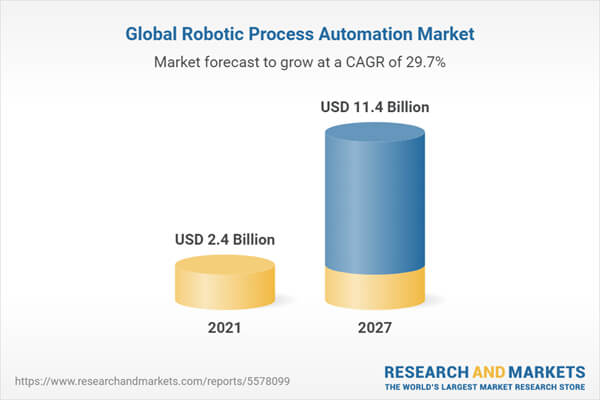Robotic process automation market seen to continue pandemic-driven boom
The adoption of robotic process automation (RPA) is expected to grow globally as the COVID pandemic accelerates the digital shift.
Based on the recently released “Robotic Process Automation Market: Global Industry Trends, Share, Size, Growth, Opportunity and Forecast 2022-2027“, the sector reached $2.4 billion last year.
While the figure could already be considered strong despite the technology being relatively new, the report sees the industry hitting a massive $11.4-billion market value by 2027, with a compound annual growth rate of 30.8 percent over the next five years.

“Due to the coronavirus disease (COVID-19) outbreak and consequent imposition of lockdown restrictions, there is a considerable rise in the shift towards remote working to comply with government regulations, continue business operations and prevent the spread of the pandemic. This represents one of the key factors driving the market,” the report said.
Read here Why Automation Matters During a Global Crisis
As previously discussed, RPA technologies allow companies to automate their operations, streamlining business processes while eradicating human errors.
“Robotic process automation (RPA) refers to an advanced software technology that builds, deploys, and manages software robots. It aids in manipulating data, passing data from different applications, triggering responses, or executing transactions,” the report said.
Compared to the traditional processing system, RPA products “offer greater resilience and higher accuracy, and accelerates transformation, improves compliance,” it added.
Tapping RPA will increase productivity as they allow employees to focus on other important things, leaving repetitive tasks.
The report said that the technologies are “increasingly being utilized” in the banking, financial services, and insurance (BFSI), healthcare, information technology (IT), and telecom industries across the world.
Players in these sectors are also integrating RPA with other advanced technologies, including machine learning and artificial intelligence, which handle cognitive processes requiring skills.
According to the report, equipping companies with RPA technologies only requires “minimal investment” but assures “a significant return on investment.”
In the local scene, with more companies embracing automation, a previously published report by AlphaBeta noted RPA as one of the technologies driving the growth of the local digital economy. The study entitled “The Growing Digital Economy in the Philippines” expects the digital transformation to contribute ₱5 trillion to the economy by 2030.
“Digital adoption has the potential to create higher quality work opportunities for Filipinos. Technology will be able to automate routine physical and interpersonal tasks, leaving humans to focus on more complex and novel tasks that require problem-solving abilities. By freeing up more time for workers to perform higher value-add tasks, technologies allow workers to switch their attention to more interesting and value-adding work,” the study said.
One of the technology leaders in the Philippines supporting the shift is Monstarlab Philippines through its RPA software, Robotic Automation Expert (RAX). Currently, RAX has a pool of clients in various key industries, including banking and finance, healthcare, insurance, and medical care. Just like what has been emphasized in the two reports, RAX seeks to evolve local companies’ operations as its technology—RAX EDITOR in particular—cuts human errors while improving their work efficiency.
Read: 4 Ways RAX EDITOR Can Improve Your Business
Discover what RAX can offer for your workplace today to keep up with the changing times. You may set up a meeting with RAX to assess the solutions your company needs.





